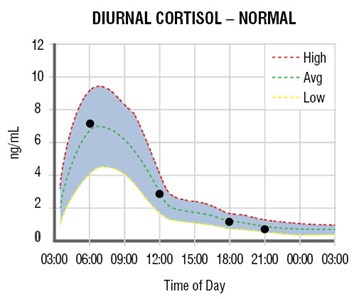Cortisol is a hormone synthesized and secreted by the adrenal glands of the kidneys that plays a major role in regulating stress, metabolism, and immunity. It follows a diurnal rhythm that is affected by sleep- naturally rising in the early morning and falling in the evening.

Why is it included in the Balance axis?
High cortisol levels are an indicator of acute (sudden), chronic (long-term), and/or traumatic (life-threatening) stress. Secondary factors associated with mental stress include alcohol drinking, smoking, a lack of exercise, inadequate sleep, and poor nutrition. Over time, prolonged high levels of cortisol (Cushing’s disease) can lead to weight gain, fat redistribution, poor sleep, a lowered immune system, and increased inflammation. Low levels might indicate poor adrenal function or Addison’s disease.
How can I better understand my results?
- Peaks in the morning between 6 am – 8 am: 10-20 ug/dL
- Falls in the evening around 4 pm: 3-10 ug/dL
While levels in the lower range are better for inflammation, morning cortisol levels under 3 ug/dL may indicate adrenal insufficiency, and above 50 ug/dL could indicate Cushing’s disease. Keep in mind that certain medications can raise cortisol levels.
If your cortisol levels are on the higher side, try:
- Herbs and natural supplements such as ashwagandha, Rhodiola, lemon balm, and chamomile
- Aim for 8 hours of restful sleep (avoid caffeine after midday, wear blue-light blocking glasses, put the screens away before bed)
- Spend more time in nature
- Practice yoga, tai chi, qi gong, and other mindfulness meditation and breathing exercises
- Foods such as dark chocolate, garlic, fermented foods (kimchi, yogurt), and plants high in vitamin C (oranges, broccoli)
- Surround yourself with healthy relationships (pets are a plus!)
If your cortisol levels are on the lower side, you can try:
Where can I learn more?
DISCLAIMER: IF YOU ARE CONCERNED WITH ANY OF YOUR RESULTS, PLEASE CONSULT WITH YOUR PHYSICIAN.
